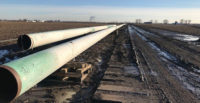For the third time since June, a federal appeals court is questioning regulators’ evaluation of a natural gas project. On Nov. 1 in a lawsuit against the planned Jordan Cove liquified natural gas plant and export terminal in Oregon and a 229-mile feeder line from Canada, the Washington D.C. appellate court ordered the Federal Energy Regulatory Commission to decide whether to suspend its 2020 approval of the $10-billion project.
After FERC approved the project in March 2020 and again two months later in a rehearing, landowner plaintiffs affected by it asked the appellate court to review the the agency decision. Among other issues, they asked the court to determine whether the FERC unlawfully granted a certificate of “public necessity” under the U.S. Constitution to an export-only LNG plant.
The court remanded the issue to FERC to consider whether a stay of the authorization is appropriate, giving it 90 days to respond. In its monthly public meeting on Nov. 18, the agency is set to determine possible changes in the certificate for the LNG facility and pipeline.
Pembina, the Canadian fossil fuel company that owns Jordan Cove, paused the project in April and said it is evaluating its path forward. While the firm said it can no longer predict with certainty when the project will be feasible, Pembina still believes in its “strategic rationale.” The project also was denied a state permit under the federal Clean Water Act.
In a Nov. 5 results call with investors, company Senior Vice President Janet Loduca said it is "continuing to work with FERC, including on the appeal." She said while Pembina will "continue to evaluate ... we do see that there's value to this asset in some way, shape or form."
The project would produce about 1 billion cu ft per day of natural gas to serve Asian export markets.
FERC Chairman Richard Glick, a former commissioner, dissented on the agency approval of Jordan Cove, then citing his discontent with its framework for deciding whether a natural gas pipeline is needed.
Glick, who became chairman in January, said in his May 2020 dissent that FERC’s approval violates the Natural Gas Act and the National Environmental Policy Act, and that the agency refused to consider impact of the project’s greenhouse gas emissions on climate change. He called the approval an example of the commission’s “serial attempts to duck its responsibilities” to evaluate GHG emissions. “That will continue until a court steps in to set things right,” he said.
The D.C. appeals court told FERC in August it also must reconsider the effects of two new LNG plants and two 135-mile pipelines in Texas on climate change and on minority communities.
The court in June also threw out the FERC approval of an already built and operating 65-mile, $220-million natural gas pipeline in Missouri, saying it was clear that there was no new demand for natural gas in the region and demand is expected to stay flat for the next 20 years. The agency also will take up ut the Spire STL pipeline approval on Nov. 18.





Post a comment to this article
Report Abusive Comment